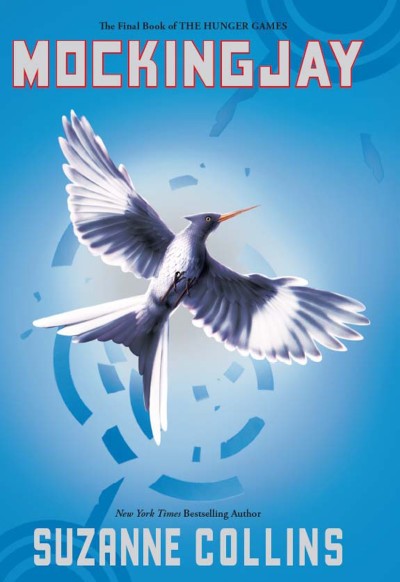Literary rating: ★★★
Kick-butt quotient: ☆☆☆
 Going into this book, I was very much aware that reader opinion about it was deeply divided, and had picked up bits and pieces of partial “spoilers,” though not enough for me to predict exactly how events would turn out. Having now read it and made my own call, I have to agree with those reviewers who feel that Collins did drop the ball, big time. But my reason for this conclusion consists of eight lines in the penultimate chapter, in which Katniss does something completely out of left field and completely foreign to her character. Granted, they’re extremely crucial lines, that color my impression of the entire book. Everything before and after that could have made the book a five-star read. If I rated those eight lines by themselves, I’d give them negative stars if it was possible. I adopted three stars as an overall rating to reflect my disappointment, but also the fact that, for most of the time I was reading, I was really liking the book.
Going into this book, I was very much aware that reader opinion about it was deeply divided, and had picked up bits and pieces of partial “spoilers,” though not enough for me to predict exactly how events would turn out. Having now read it and made my own call, I have to agree with those reviewers who feel that Collins did drop the ball, big time. But my reason for this conclusion consists of eight lines in the penultimate chapter, in which Katniss does something completely out of left field and completely foreign to her character. Granted, they’re extremely crucial lines, that color my impression of the entire book. Everything before and after that could have made the book a five-star read. If I rated those eight lines by themselves, I’d give them negative stars if it was possible. I adopted three stars as an overall rating to reflect my disappointment, but also the fact that, for most of the time I was reading, I was really liking the book.
On the plus side, the book is a definite page-turner. I relished my reading time, hated to put it down, and was eager to take it up again. The prose is vivid and smooth-flowing (I’m completely used to Katniss’ present-tense narrative voice); the author evokes powerful emotions; the plotting throws us frequent surprises I did not expect, even after, as I said, picking up partial spoilers here and there; there are thought-provoking moral dilemmas that are usually resolved appropriately (with one lulu of an exception!), and action scenes are handled well. For the most part, the characterization is life-like (again, with one exxception). To be sure, this is a very dark read. Characters the reader deeply likes die, often horribly. The painful cost of war, even necessary war that’s waged to eradicate great evil, isn’t glossed over and minimized. But that isn’t necessarily a flaw in the book.
I would, having read the book, defend it against some of the criticisms I’ve met with. Although my own daughter thinks it preaches a message of ultimate despair and negation, I honestly did not take that from it; I found it much more positive and hopeful than that. (In that respect, I was actually pleasantly surprised, having expected much worse.) Through most of the book, I found Katniss’ character pretty consistent with the one we met in the first two books. Frankly, I did not find her selfish, self-absorbed, or immature here, allowing for the fact that for large portions of the book she’s traumatized (with good reason) and heavily drugged. There are plenty of instances throughout the book where she acts with enough selflessness and sacrificial concern for others (and more maturity than some of the adults) to absolve her from these charges, IMO. All but one of her actions in the book are, in my estimation, either justified –even if they’re gut-wrenching– or excusable and understandable. Some readers have criticized Collins’ plotting decisions in places, but I find all but one defensible and justified, including the crucial one of how much of the action Katniss is privy to. And while the author makes the point that even justified revolutions can have some leaders who are only motivated by desire for their own power, and who would willingly betray the revolution once they get a chance (historically, that’s happened frequently!), I did not see any message that armed resistance to tyranny is always automatically wrong and futile.
I’m not sorry I finished reading the series and made my own judgment of it. I’m just sorry that Collins didn’t respect her main character (and her readers!) enough to let Katniss consistently be who she’s been shown to be through hundreds of pages and virtually an entire immersive reading experience.
Author: Suzanne Collins
Publisher: Scholastic Press, available through Amazon, both for Kindle and as a printed book.
A version of this review previously appeared on Goodreads.




